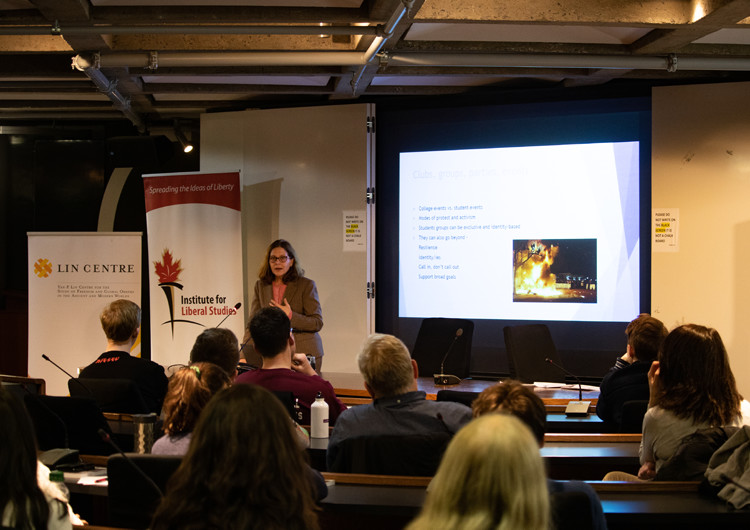Over the past few years, a number of high-profile universities in North America have experienced brawls, protests, and fires from students objecting certain guest speakers invited to their campuses. Sigal Ben-Porath, author of Free Speech on Campus and professor at the University of Pennsylvania, spoke to the issues surrounding free speech on university campuses at an event hosted by the Institute of Liberal Studies (ILS) and the Research Group for Constitutional Studies (RGCS) on Feb. 7.
According to Ben-Porath, universities require different norms and interpretations of free speech than the general public does.
“Within the legal framework in which we operate, we need separate rules [on campuses] because the role of speech on a college campus is different than in a public sphere in a democracy,” Ben-Porath said.
She argued that laws in the public sphere need to remain neutral to differing opinions because, in a democracy, the ability to express one’s opinion is a fundamental right that preserves citizens’ equality. Universities are still subject to those legal norms, but their academic and research goals alter the meaning of free speech within their walls.
“Historically, [the mission of universities] relates to the search for knowledge, pushing the boundaries of what is known, trying to understand more about the world and self, and disseminating this information publicly and for students,” Ben-Porath said. “Today, the university’s mission has expanded, including educating more diverse students.”
Ben-Porath noted that balancing their roles as educational institutions and proponents of diversity is a modern challenge for universities. Her solution for reconciling the two identities involved a framework she called ‘inclusive freedom.’
“My general effort is to create an inclusive climate,” Ben-Porath said. “One which protects and defends open expression while addressing the tensions, concerns, and burdens it creates.”
Ben-Porath suggested that universities should use a hands-off approach when managing student discourse about free speech on campus. At the same time, the administration has a responsibility to address any tensions that emerge out of controversial speech by ensuring that students feel dignitary safety, meaning they feel recognized as equal members of the university community.
Ben-Porath saw her solution as applicable to a variety of campuses, creating a safe environment without restricting students’ ability to engage with difficult questions. She pointed to several administrations that have effectively built ‘inclusive freedom’ into their policies.
“Classes are essential for intellectual risk-taking and honesty,” Ben-Porath said. “The professor has the responsibility to create the conditions for an open and honest exchange [….] I also think student groups are central to creating an atmosphere where views that are not common on campus can be brought in and discussed.”
However, not all students agree to such a hands-off approach. Caterina Pacifico, U0 Science, attended the guest lecture and thought differently.
“When a known racist or someone promoting truly harmful speech is invited to campuses I feel like administration can take a more proactive role than Ben-Porath suggests,” Pacifico said. “Who is it benefitting [besides] the speaker that gets to spread hate speech?”
The most recent case of student protest at McGill is the #ChangeTheName campaign supporting the removal of a racial slur from the men’s varsity team name. Students’ Society of McGill University (SSMU) Indigenous Affairs Commissioner and leader of the campaign Tomas Jirousek credits the campaign’s headway to his rights for free speech and assembly on campus.
“Freedom of speech laws can have a huge impact on campaigns such as mine,” Jirousek wrote in an email to The McGill Tribune. “It’s been important to understand that both support and opposition to my campaign to change the name also complies with freedom of speech laws or the spirit in which they were crafted, specifically the right to free speech under reasonable limits [….] I’ve tried to be incredibly respectful of those on the other side of the dialogue, and avoiding any demonization or discussion that could prove hurtful or painful for everyone involved.”








